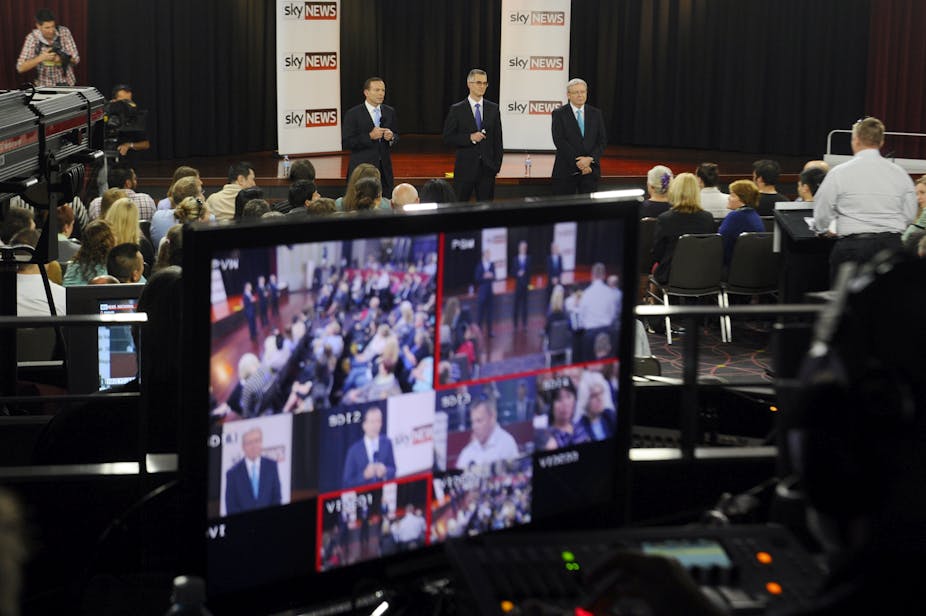I’ve written about Ian: the ordinary bloke who stole the show at the final people’s forum by flustering Tony Abbott and Kevin Rudd, and enraging the watching audience all at the same time. At face value, he did this just by being “Ian”, and saying what was on his mind - that paid parental leave schemes subsidise “pretty little lady lawyers”.
We’ve heard that the people’s forums matter because they put the people into the spectacle of modern media politics. Doing this adds a welcome air of unpredictability to proceedings. The problem is this unpredictability isn’t surprising.
The people’s forum promised to reverse political communication as we know it. No spin, no control, the promise of the unexpected. This is, in every aspect, an illusion. What we saw last night was television at its most powerful; as an orchestrator of public life. This is far more important than the issue of who won or lost the debate. And it includes the folks at home in its cast of characters.
At stake here is not just how the debate organised voters onscreen: it is how it organised voters around screens - and afterwards. It did this through television’s unique capacity for “liveness”, an aesthetic principle that explains why TV remains the major player in media politics.
Rudd and Abbott have done a fairly good job of avoiding major gaffes in the debates. This is probably because politicians know only too well how quickly their slick message can unravel when faced with members of the public. Just ask former British prime minister Gordon Brown, who ended up having to apologise because he was caught in an unguarded moment criticising a pensioner’s views on immigration.
The problem is, these “unscripted” intrusions are scripted in every way, and that’s why we watch.
Television has always drawn audiences with the allure of the unexpected. The trick is, television seduces us by “feeling” live, even when it isn’t. The debates work because they return us to a time when television really was live most of the time, and so watching it gave audiences the sense that they were watching history as it happened.
Certainly, there have been landmark moments where voters have seen politicians crash, right there, in pixels. When former US vice president Dan Quayle made the mistake of comparing himself to JFK back in 1988 while debating Lloyd Bentsen, the more experienced politician quipped:
Senator, I served with Jack Kennedy. I knew Jack Kennedy. Jack Kennedy was a friend of mine. Senator, you are no Jack Kennedy.
We watch because we hope to see something similar, to have “been there” when it happens.
This means that when it comes to the people’s forum, it wasn’t just the people in the studio who were performing. When we think of “performing audiences” we also have to think about the folks who were watching at home, down the pub, or wherever. These people were also organised and played important roles in persuading all of us that the debates are something we need.
The thing is, we know how to act around the debates, because we know “event TV” when we see it. It’s a ritual, and we know our roles.
From the early days of political communication research, scholars have known that form is more important than content. Media use is deeply ingrained in social life. The act of reading the paper - or watching television - is more important than the content we find. These habits, in and of themselves, give a sense of being connected to the world an other people.
We know this from other media experiences. Think about watching Friends or Big Brother or Breaking Bad: they’re all about sharing surprising moments with people we care about, other friends, or our family. That is, we’re used to acting out our social roles by organising out lives around the screen.
So it’s no different when we take on the role of the voter. And what’s more, television continues to define who we are - even when we aren’t watching. How many of us are in heated debates, right now, about who won the debate? Thank you, television.
Sure, talk about who did better. Sure, talk about the power of vested media interests. But discuss the bigger picture too.
Because the really big story is how television organises how we think about and behave around politics. It’s convinced us that we must have these debates, even if they end up being disappointing affairs.
Make no mistake, the debates were about what TV wants. Not what voters need.

